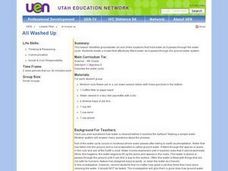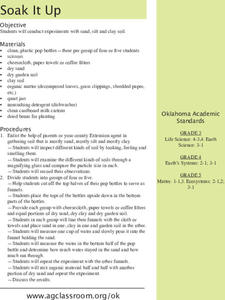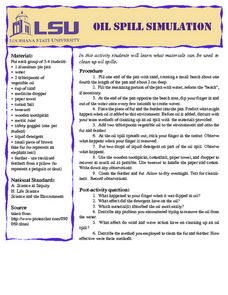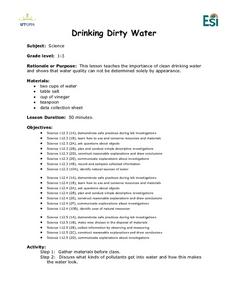Teach Engineering
Basically Acidic Ink
If you don't want to drink red cabbage juice, here's another use for it—a decoder! Using vinegar and ammonia-based window cleaning liquids as invisible inks, scholars create designs in the second lesson of the series. Red cabbage juice...
Beyond Benign
In a Lather
Time to come clean! Scholars continue preparing the shampoo they created in the previous two lessons. The purpose of this stage is to calculate the perfect amount of additive to make the shampoo lather.
Curated OER
All Washed Up
Fourth graders simulate filtration of water containing contaminates to determine how nature cleans water. They make predictions, report observations, and construct reasonable explanations concerning their outcomes. then connect this to...
Curated OER
Ugh! We DRINK This Stuff?
Students explain the processes involved in the cleansing and purifying of surface water. After a lecture/demo, students engage in an experiment that illustrates how water is cleansed before we drink it.
Curated OER
Pollution Solutions
Young scholars participate in a hands-on activity to determine how water is polluted and investigate steps in how to treat water. Students try to produce the cleanest water possible using the materials provided.
Curated OER
Is It Safe To Go In?
Students examine acceptable levels of toxins in swimming areas. Working in groups of four, students dilute a salt or sugar solution to 1 part per 1,000,000 (ppm) solution. Students taste test their diluted liquids and record at which...
Curated OER
Build an Exhibit
Eighth graders discover the importance of keeping the water in the water supply clean. Using the internet, they complete an activity in which they record their answers on a worksheet. In groups, they create their own exhibit on...
Curated OER
River and Us (A)
Students define and demonstrate proper use of common good, preserve (as in clean water) and public good as applicable to clean water.
Curated OER
Soak It Up
Learners examine the various materials that make up their local soils. In groups, they record how each material is different and use cheesecloth to filter them into a bottle based on particle size. They use the soils to determine if...
Curated OER
Florida Springs
Students discover the many uses of water and the sources of the water we see. They complete a worksheet about the water usage at school and at home.
Curated OER
Science: Headline
Students are able to identify questions they need to answer to comprehend a specific news article. They are pushed to question how they know that their drinking water is safe.
Curated OER
Water Prism
Students using a glass prism filled with water are able to see all of the visible colors found the sunlight.
Curated OER
Wonderful Waves
Students read about water, waves and the sea. They experiment with the action of water by pouring water into baking pans and watching how it moves. They build and examine a 'wave bottle' by adding colored water and vegetable oil to a...
Curated OER
Oil Spill Simulation
Students examine the materials that can be used to clean up an oil spill. They experiment with vegetable oil and a variety of substances to see which clean the oil the best.
Curated OER
Germs and Microbes
Students observe how to clean their hands with antibacterial wipes or instant hand sanitizers. They discuss the steps to germ fighting and use reproducibles, fingerplays, and songs to reinforce that cleaning hands and fighting germs are...
Curated OER
Where, Oh Where is All the Clean Air?
Middle schoolers examine the history of air pollution dating back to the Roman Empire. In groups, they research the different types of pollutants in the air and how they can affect the environment. They participate in various...
Curated OER
Oil Spill Clean Up
Students use various methods and materials to clean up a simulated oil spill that has occurred. Once clean the students will decide which method or material was most useful
Curated OER
Drinking Dirty Water
Students consider the importance of clean drinking water. They conduct a taste experiment with water, adding incremental drips of salt and vinegar to determine at which point it doesn't taste drinkable.
Curated OER
Take a Dip: The Water in Our Lives
Students explore the function of storm drains and the importance of keeping them clean of debris. They obtain permission from local authorities and perform community service painting stenciled messages near existing storm drains.
Curated OER
Planet Dermis: How does soap clean me?
In this hygiene activity, students perform an 8 step experiment in which they learn how soap works to clean things. There are pictures to go along with the steps.
Curated OER
Junior Engineering Surface Water
Students experience the effects of pollution and erosion on a model of a watershed and explore ways to change the outcome.
Curated OER
How Clean Is Our Water?
Students examine samples of water to determine its cleanliness. They visit a waste treatment plant and/or reservoir. Students explore what protects the water supply from contamination by chemical or organize pollution. They trace the...
Curated OER
Plants Releasing Water
Third graders investigate how water is released from different plants into the atmosphere. They observe and investigate two types of plants with domed lids with condensation and communicate those observances and inquiries on an in-class...
Curated OER
Global Change — Change and Cycles Where Land, Air and Water Meet
Students participate in an experiment to define a parts-per-billion solution. For this ecology lesson, students select a second substance to create a parts-per-billion solution and observe and record their results. Students work in...
Other popular searches
- Cleaning Water
- Cleaning Dirty Water
- Cleaning Water Experiments
- Sludge Cleaning Water
- Ways Cleaning Dirty Water
- Cleaning an Oil Spill in Water

























